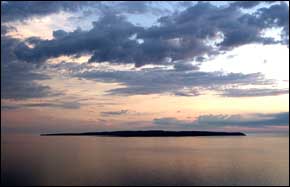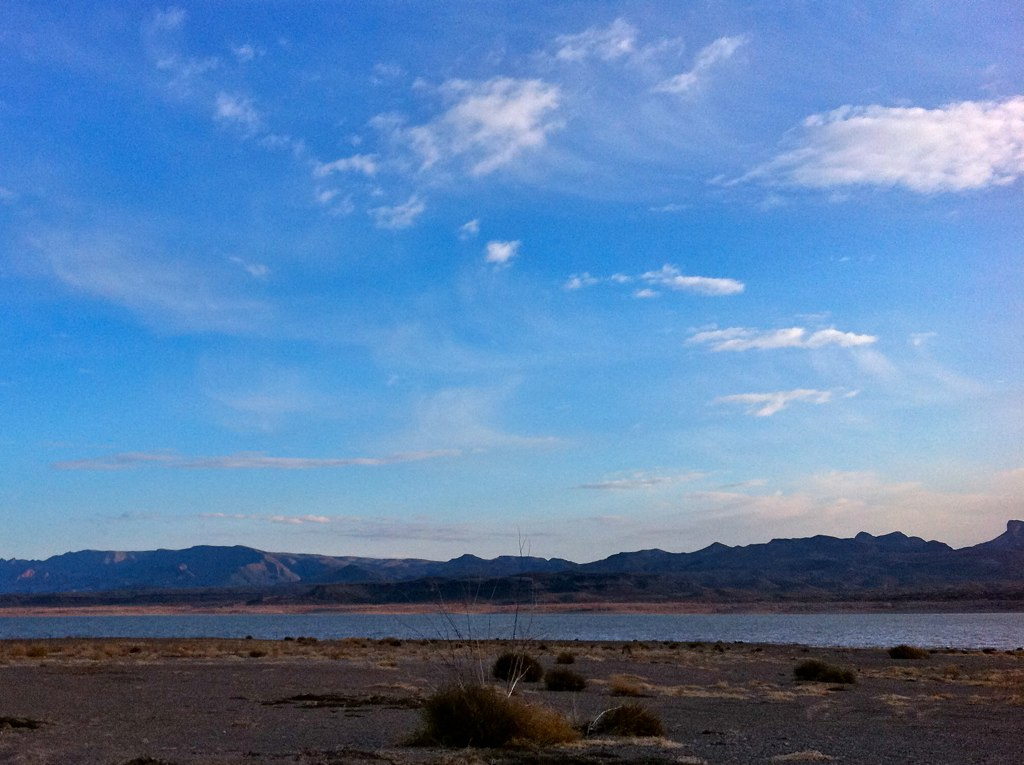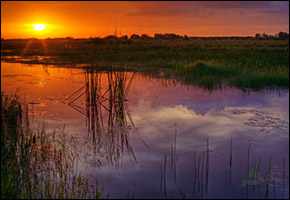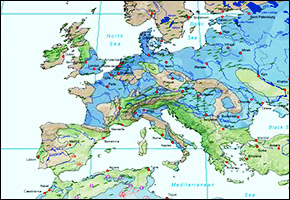Towards a Blue Economy: Michigan’s Freshwater Future

Midwest leader travels to Mideast to secure his state’s blue economy.
By Steve Kellman
Circle of Blue
John D. Cherry Jr., Michigan’s lieutenant governor, spent eight days last month on a trade mission to Israel and Dubai, and returned with inked deals for start-up technology projects with two Israeli water companies.
One of the companies, EPC Ltd.’s Onsite Wastewater Solutions, is planning a project in eastern Michigan that will help small communities solve wastewater issues in new ways. The other business, Emefcy, is creating a Michigan-based pilot of its microbial fuel cell (MFC) technology that will generate energy directly from wastewater.
The Israeli water projects, Cherry’s office said in a statement, “are a step toward establishing Michigan as the North American leader in water technology.”
In an interview with Circle of Blue, Cherry talked about his trip and several other big water issues confronting Michigan — the Great Lakes Compact, and the Asian carp that now threaten the region’s $7 billion sport fishing industry. Cherry, who earlier this year formed a gubernatorial committee to explore entering the race next year for the governor’s office, also discussed his “blue economy” plans involving water technology investments for the future, and the infrastructure and legislative measures to protect Michigan’s freshwater, one of the largest supplies of clean water on the planet.
Michigan’s Water Competitiveness
During Cherry’s trip to Israel and the United Arab Emirates, the lieutenant governor participated in a panel discussion in Tel Aviv about the water challenges facing North America at WATEC Israel 2009, the International Water Technologies, Renewable Energy and Environmental Control conference.
“Water technology companies from other countries are using WATEC and its annual event as a way to look for opportunities to market themselves to other parts of the world,” Cherry said. “It’s very clear that there are a number of (foreign) businesses looking at how they might enter the U.S. market. They understand as we do that 10 or 15 years from now we’re going to see a number of states, perhaps as many as 30, that are going to be water stressed. They have a number of technologies that will help address those questions.”
“One of the things I was trying to convey was that Michigan could be a great platform for them to launch an effort in the U.S. market. We have done a number of things, such as advanced battery activity, that show we are a good partner with companies that are seeking to do business throughout the United States.”
Cherry noted that in August, General Motors chose a Michigan location for the nation’s first high-volume U.S. automotive lithium ion battery manufacturing facility. Meanwhile the U.S. Department of Energy awarded more than $1.35 billion in grants to 12 Michigan projects to support advanced battery and electric vehicle manufacturing and development.

Cherry said that he also spoke with several other Israeli companies for future partnerships.
“Aside from the fact that there’s technology available and they have that, we can learn that there are new ways of looking at how we manage water,” he said.
Following Israeli Conservation Techniques
For decades Israel has struggled to maintain its diminishing groundwater resources and to adapt to low rainfall coupled with severe drought. Experts consider the country a pioneer in water conservation — with its varied irrigation, desalination and recycling techniques.
As an example, Cherry mentioned how Israel reuses its “grey water” — wastewater that has been used for things like taking baths or washing laundry but not for flushing toilets.
“Grey water is not an area that’s widely viewed as a water issue in the United States. But in Israel 80 percent of water users recycle their water. They have learned of the environmental concerns with recycled water, how to deal with it, and how to maximize its potential,” he said. “I think when you’re looking at strategies to meet water shortages, examining what’s happening in Israel gives us some ideas. It helps us break out of our mold of thinking.”
Cherry said the U.S. agricultural sector has adopted water conservation measures that are consistent with the Israeli techniques, and he called for similar steps to be taken in the residential and commercial sectors.
The Mideast trip follows the efforts of Cherry, Governor Jennifer Granholm, and other state officials to position Michigan as a global leader in water technology. During a November 2008 trip to Israel and Jordan, Granholm met with business leaders, including those in water treatment technology, to encourage them to do business in Michigan. She also signed a memorandum of understanding with Israel’s deputy prime minister to establish a joint task force on water technology.
In April, Cherry announced a “Green Jobs for Blue Waters” economic diversification initiative to target the water technology sector. As part of the initiative, Detroit and Farmington Hills announced a partnership with the Israeli company Miya for demonstration projects to lower energy costs by reducing water loss caused by aging infrastructure. Miya is a global leader in urban water loss management technologies, including water pressure management, leak detection and selective pipe replacement.
Cherry cited Michigan’s manufacturing background, the recent successes in winning advanced battery development work, and its status as the only state that sits entirely within the Great Lakes Basin as factors that position the state as a water technology leader.
Water and Manufacturing
But that expertise will be wasted if the region’s water is not protected by stringent, thorough legislation, he said.
Cherry said he is still concerned about the possibility of withdrawals from the Great Lakes despite last year’s passage of the Great Lakes Compact, which aimed to protect the freshwater bodies from large-scale diversions. While the compact requires each Great Lakes state to regulate large-scale water withdrawals and develop conservation policies, it lets states individually decide to allow bulk exports of water in containers smaller than 5.7 gallons, such as bottled water.
“I think the notion of a five-gallon limitation is fairly artificial,” Cherry said. “The irony of that is all those five-gallon containers end up on one truck.”
Cherry said he supports the resolution introduced in June by U.S. Rep. Bart Stupak, (D-Mich.), to clarify that the compact prohibits Great Lakes water from being sold, diverted or exported outside of the basin.
He also supports a bill introduced by Democratic state Rep. Dan Scripps in September to establish that groundwater and Great Lakes water are both a “public trust.” The public trust doctrine states that certain resources, like water, are preserved for public use and assume government protection.
“There’s an argument over whether just by convention groundwater is a public trust,” Cherry said. “But what Dan’s bill does is lock it in. We tend to think of groundwater as something distinct from surface water in the Great Lakes but in fact the groundwater is closely related to the level of surface water. We clearly view surface water as a matter of public trust, and I support viewing groundwater (that way) as well.”
But the Great Lakes face a more immediate threat these days — the giant Asian carp. The invasive species, which escaped from Arkansas fish farms in the 1990s, has been making its way north up the Mississippi and Illinois rivers since then. Because of their large size — up to 100 pounds and more than four feet long — and their rapid rate of reproduction, the fish pose a massive risk to the Great Lakes ecosystem.
Though the U.S. Army Corps of Engineers installed an electric barrier near Chicago to keep the fish out of Lake Michigan, DNA tests of the water recently picked up signs of the invasive species beyond the barrier.
“There’s no doubt that Asian carp would be very destructive to the fisheries in the Great Lakes,” Cherry said. “We’re talking about a multi-billion dollar economic activity for Great lakes states. You’re talking about an ecosystem that could potentially be destroyed by this invasive species, so I don’t think you can tolerate much risk. Obviously the Corps of Engineers believed that the Asian carp barrier would be totally sufficient to resolve this, but as we see changes in water levels and the discovery of DNA beyond the barrier, no one can have the same confidence today.”
More drastic measures are needed, he said.
“We need to begin thinking about a physical barrier that prohibits the flow of water from one basin to another and just seal off the introduction of Asian carp into the Great Lakes.”
To that end Michigan Attorney General Mike Cox, who is also running for governor, recently filed suit in the U.S. Supreme Court seeking a preliminary injunction to close the locks that connect the carp-infested waters of the Mississippi and Illinois rivers with the Great Lakes. Cox is also seeking a permanent closure to the connection, which was established more than a century ago to divert Chicago sewage from Lake Michigan and into the rivers instead.
Read more about the Lt. Governor’s trip here and follow our coverage of the Great Lakes Compact here.
Steve Kellman is a Circle of Blue writer and reporter. Reach him at circleofblue.org/contact.











Leave a Reply
Want to join the discussion?Feel free to contribute!